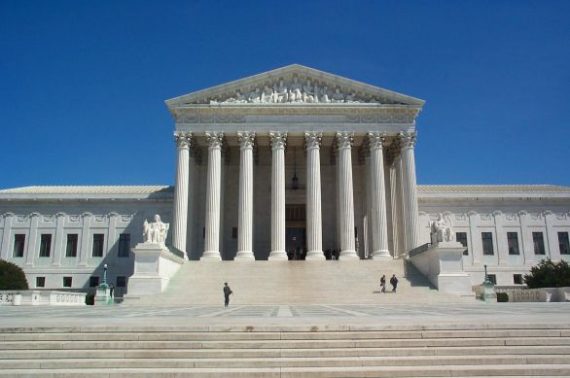Almost Everything You Know About The Supreme Court Is Wrong
Not surprisingly, American's partisan views on the Supreme Court are pretty much wrong.
SCOTUSblog’s Tom Goldstein explains that most of the conventional wisdom about the nation’s highest Court is wrong:
Ideologues on both the left and right, as well as the public generally, frequently repeat their own received wisdoms that the Supreme Court is an easily categorized institution and that the Justices are committedly “liberal” or “conservative,” with Justice Kennedy as the lone swing vote. Liberals and conservatives also consistently accuse their opposites of being “activists,” a point vividly on display in the Senators’ opening statements in the Kagan confirmation hearings. The just-completed Term proves, I think, that those generalizations are often misleading or outright wrong.
The general perception is that the Court decides its big cases by five-to-four majorities on ideological lines. For example, the conservative majority in Citizens United recognized a greater constitutional right for corporations to spend money in elections. McDonald v. City of Chicago extended gun rights to states and localities. Perdue v. Kenny A narrowly limited the ability of civil rights attorneys to receive an enhancement of their fee awards on the basis of great success. And in a summary order, Hollingsworth v. Perry blocked the video transmission of the “Proposition 8” trial over gay marriage in California.
Much more rarely, conventional wisdom goes, Justice Kennedy “flips” to give a narrow win to the four “liberals.” So Christian Legal Society v. Martinez authorized universities in certain circumstances to deny funding to student groups that exclude certain students from membership. Padilla v. Kentucky held that attorneys have an obligation to advise their clients of the immigration consequences of pleading guilty. And in Wellons v. Hall, the Court summarily ruled in favor of a death penalty defendant.
The liberal critique of the Court is that the conservative majority is moving the law decidedly to the right at every turn. Thus, Citizens United overturned decades of precedent, and McDonald significantly expanded gun rights.
(…)
It is certainly fair to say that some of the most consequential cases of the Term are decided by that narrow conservative majority. Citizens United and McDonald fit that description, as does the attorney’s fees case, Perdue.
But it is inaccurate to describe the Court as methodically on the march to the right. The ideologically confused majorities just described illustrate the point. So do other decisions with a conservative orientation that pulled up well short of their farthest possible reaches. Thus, the Free Enterprise Fund decision announced a critical proposition of constitutional law but left the PCAOB intact other than the relatively minor surgery of excising the “for-cause” removal provision of its governing statute. McDonald did significantly change the understanding of the Second Amendment, but it’s far from clear that it will significantly affect states’ ability to regulate guns and gun possession. Salazar v. Buono invalidated an injunction against the Mojave cross land-transfer statute (a conservative result). But Justice Kennedy’s opinion for the Court, joined by the Chief Justice, permitted the plaintiff to continue to pursue his claim under the Establishment Clause on remand. In Stop the Beach Renourishment v. Florida Department of Environmental Protection, the Court not only rejected a property rights challenge to a state beach-erosion statute (a liberal result), but Justice Kennedy also declined to provide a fifth vote for the proposition that a court ruling could ever constitute a “taking” of private property requiring “just compensation.”
But, what about the liberal meme that the Court is pro-business ? As Goldstein notes, that isn’t necessarily true either:
The liberal critique of the Court as grossly pro-corporate similarly does not hold water. Citizens United is undeniably a pathbreaking case that will enhance the role of corporations in the political process. So too, rulings in recent terms in cases such as Ashcroft v. Iqbal increased the prospect that defendants (which are often corporations) will have greater success in securing the early dismissal of lawsuits.
But it simply is not accurate to say more broadly that the Court consistently rules in favor of corporations or defendants.
Obviously, what’s happening here is that liberals and conservatives are both viewing the Court’s decisions through ideological eyes rather than legal ones, not surprising since they are politicians rather than attorneys.
One good example of this is the recently decided Chicago Gun Case.
Several media outlets, as well as political pundits on both sides of the aisle, reportedly erroneously that the Court had “struck down” Chicago’s handgun ban. In reality what happened is that the Court simply overruled the Court of Appeals’ determination that the Second Amendment did not apply to the state and remanded the case back to that Court for a them to rule on the actual Constitutionality of the law. Now, since the Appeals Court will be applying the standard set forth in District of Columbia v. Heller, it’s obvious that the Chicago ban will be over-ruled, but when people aren’t even getting the results of a decision right, it’s clear that they’re looking at it through ideological glasses.
On the right, for example, many seem to view this case as the beginning of the end of all gun control laws. However, if you actually read Justice Scalia’s majority opinion in Heller and Justice Alito’s opinion in McDonald v. Chicago, it is very clear that all the Court has held is that absolute bans on hand gun ownership are unconstitutional, and even that only by 5-4 majority. Both opinions make clear that there is room under the Second Amendment for some government regulation of firearms. Conservatives who think that this is the end of gun control, or liberals who fear it, are looking at these cases through the lens of their own political biases.
Of course, ignorance about the Supreme Court isn’t all that surprising. Just last week, I noted a new Pew poll that showed that Americans had a very incorrect view about what it is that the Supreme Court actually does. And, last month, we discovered that most Americans have no idea who is actually on the Supreme Court. So, it shouldn’t be too surprising that most of the partisan arguments about the impact of Supreme Court cases are completely wrong as well.






I think if you compare the liberal and conservative justice votes on the three big corporate political speech cases over the last 40 years, I think you can see that the “liberals” on the court have become more statist, while the “conservatives” have become more libertarian:
First National Bank. v. Belloti (1978): Liberal Majority supports First Amendment Right of Corporations against government campaign regulations (including Stevens). Conservative Rehnquist dissents.
Austin v. Michigan Chamber of Commerce (1990): Liberal Thurgood Marshall supports government campaign regulations against Corporation’s First Amendment Rights, joined by traditional Conservatives Rehnquist and White. Dissents filed by new conservatives, O’Connor, Kennedy and Scalia.
Citizens United (2010): Conservatives overrule Austin and reaffirm Bellotti. Liberals restate support for Austin.
You do have a point there. It is interesting that the liberal wing of the Court doesn’t seem to have the same attitudes about the First Amendment that Justices like Brennan, White, and Douglas did in their day.
I disagree with PD Shaws premise. Putting corporate speech into the same category as “real-person” speech is a mistake. Corporations cannot suffer the consequences of their actions the way people can and therefore should not be placed in the same category. Put simply, if a some corporate officials decide to lie or slander someone and are caught at it, the corporation, not the officials will be held to account and the money to pay the fine will come from the corporate coffers. If an individual is punished, it has real consequence to them.
“It is interesting that the liberal wing of the Court doesn’t seem to have the same attitudes about the First Amendment that Justices like Brennan, White, and Douglas did in their day.”
Or more plausibly, the so-called liberal wing today is nowhere near as liberal as the liberal wing of decades ago, media commentary notwithstanding. Stevens went from arguably the middle vote on the Court in his early years to supposedly the most liberal Justice, despite largely not changing his positions over time.
“Put simply, if a some corporate officials decide to lie or slander someone and are caught at it, the corporation, not the officials will be held to account and the money to pay the fine will come from the corporate coffers.”
I’m not crazy about Citizens United, but I think the above is wrong. I don’t believe that there’s any principle of tort law that prevents both the corporation andits agents from being sued jointly for acting wrongly. Consider a medical malpractice case: The hospital and the medical team, individually, can be sued in the event.
Even the photo above is wrong. A common citizen can no longer enter through the front door but must go around to the servants entrance.